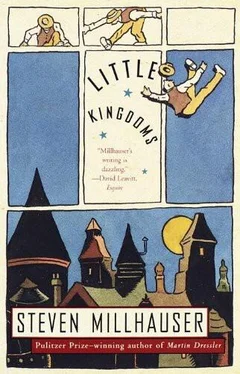THE CASTLE. The castle lies on a steep cliff on the far side of the river, three hundred feet above the water. In bright sunlight the castle seems to shine out from the darker rock of the cliff and to thrust its towers gaily into the blue sky, but when the air darkens with clouds the castle draws the darkness into itself and becomes nearly black against the stormy heavens. From our side of the river we can see the Princess’s tower, the battlements of the outer wall, including the vertical stone spikes on the merlons, and two arched gates of darker stone. Beneath the Princess’s tower lies her walled garden. We cannot see the garden walls or the garden itself, with its paths of checkered stone, its turf-covered benches, and its shady bower of trelliswork sheltering two couches covered in crimson silk. We cannot see the courtiers walking in the Court of the Three Fountains. We cannot see the Prince’s oriel overlooking the slate roof of the chapel, we cannot see the row of marble pillars three of which are said to come from the palace of Charlemagne at Ingelheim, we can only imagine the hall, the brewhouse, the bakehouse, the stables, the orchard, the park with its great alleys of shade trees, the dark forest stretching back and back and back.
TALES OF THE PRINCESS. There was once a beautiful Princess, whose skin was whiter than alabaster, whose hair was brighter than beaten gold, and whose virtue was celebrated throughout the land. One day she married a Prince, who was as handsome as she was beautiful; they loved each other entirely; and yet within a year their happiness turned to despair. Some held the Prince to blame, saying he was proud and jealous by nature, but others accused the Princess of a secret weakness. By this they meant nothing less than her virtue itself. For her virtue, which no one questioned, made her secure against the attentions of admirers, and prevented her from imagining even the possibility of unfaithfulness. Because of her deep love for the Prince and her knowledge of her own steadfastness, she failed to fortify herself with haughtiness, reserve, and a sense of formidable propriety. Instead, while acting always within the strict constraints of court etiquette, she was unaffected in manner, generous in spirit, and open to friendship with members of her husband’s intimate circle. Moreover, her love for the Prince led her to follow closely all matters at court, in order that she might understand all that concerned him and advise him sagely. It was therefore in no way unusual that she should take an interest in the stranger who arrived one night on a richly caparisoned horse, and who quickly won the friendship of the Prince by virtue of his nobility of bearing, his boldness of spirit, his thirst for knowledge, and his gift of ardent speech, but who nevertheless, saying only that he was a margrave, and that he came from a distant land, bore on his escutcheon the word Infelix: the Wretched One.
THE TWO STAIRWAYS. The stairways are circular and are composed of heavy blocks of stone that wind about a stone newel. Both stairways spiral to the right, in order to give the advantage to the defender, who with his right hand can wield his sword easily in the concavity of the round wall, while the attacker on the lower step is cramped by the newel’s outward curve. One stairway winds up past slitlike openings that give higher and higher glimpses of the little river, the little town with its double wall, the little mills along the riverbank, until at last it reaches the chamber of the Princess at the top of the tower. The other stairway begins in a subterranean corridor beneath the torture chamber and winds down and immeasurably down, in a darkness so thick that it feels palpable as cloth or stone. After a time the steps begin to crumble, sprouting black vegetation; gradually the outlines of the steps become blurred, as if the reason for steps has been forgotten. This stairway, which some imagine to narrow slowly until there is space only for the rats, descends to the dungeon.
THE WINDOW RECESS. The Prince, who was often closeted for long hours with his councillors in order to discuss a pressing matter of territorial jurisdiction, was grateful to the Princess for attending to his new friend. Accompanied by two ladies-in-waiting, the Princess walked with the margrave in the walled garden beneath her tower, or sat with him in a small receiving chamber attached to her private rooms in the great hall. The small chamber had a pair of tall lancet windows set in a wide recess with stone window seats along the sides. The many-paned windows looked down upon wooded hills and a distant twist of river. One day as the Princess stood at the window, looking out at the far river, while the margrave with his sharp brown beard and amethyst-studded mantle sat back against the angle formed by the stone seat and the windowed wall, the Princess was startled from her revery by the sound of suddenly advancing footsteps. She turned quickly, raising a hand to her throat, and saw the Prince standing in the arched doorway. “You startled me, my lord,” she said, as the margrave remained motionless in shadow. The dark stranger in the corner of the window seat, the startled, flushed wife, the stillness of the sky through the clear panes of glass, all this caused a suspicion to cross the Prince’s mind. He banished the thought instantly and advanced laughing toward the pair at the window.
THE RIVERSIDE. Directly to the west of the town, on the bank of the river between the copper mill and a grist mill, lies the broadest of our town meadows. To reach it we must first cross the dry moat on a bridge made of oak planks, which is let down every morning by chains from within the gate-opening in the outer wall, and is raised every night so that it fits back into the opening and seals the space shut. The meadow is supplied with shade trees, mostly lime and oak; a path runs along the river, and there are fountains carved with the heads of devils and monkeys. Here on holidays and summer Sundays the townsfolk play bowls, wrestle, dance, eat sausages, stroll along the river, or lie on the bank. Here wealthy merchants and their wives mingle with pork butchers, bricklayers, rope makers, laundresses, apprentice blacksmiths, journeyman carpet weavers, servants, day laborers. Here at any moment, throwing back our heads to laugh, or shifting our eyes slightly, we can see, through the sun-shot branches of the shade trees, the shimmering river, the sheer cliff, the high castle shining in the sun.
THOUGHTS IN SUN AND SHADE. As the Prince walked in the shady park, stepping through circles and lozenges of sunlight that made his dark velvet shoes, embroidered with gold quatrefoils, seem to glow, in his thoughts he kept seeing the Princess turn suddenly from the window with her hand on her throat and a flush on her cheek. The persistence of the image disturbed and shamed him. He felt that by seeing the image he was committing a great wrong against his wife, whose virtue he had never doubted, and against himself, who admired forthrightness and disdained all things secretive, sly, and hidden away. The Prince knew that if anyone had so much as hinted at unfaithfulness in the Princess, he would without hesitation have cut out the false accuser’s tongue; in the violence of the thought he recognized his inner disorder. He was proud of the frankness between him and the Princess, to whom he revealed his most intimate thoughts; in concealing this thought, of which he was ashamed, he seemed to himself to have fallen from a height. Walking alone along the avenue of the park, through lozenges of sunlight and stretches of shade, the Prince reproached himself bitterly for betraying his high idea of himself. It seemed to him suddenly that his brown-bearded friend with the amethyst-studded mantle was far worthier than he of his wife’s affection. Thus it came about that in the very act of self-reproach the Prince nourished his secret jealousy.
Читать дальше












